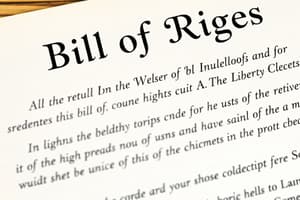Podcast
Questions and Answers
The Bill of Rights consists of the first twelve amendments to the United States Constitution.
The Bill of Rights consists of the first twelve amendments to the United States Constitution.
False (B)
The Eighth Amendment prohibits excessive bail and cruel and unusual punishment.
The Eighth Amendment prohibits excessive bail and cruel and unusual punishment.
True (A)
The Second Amendment guarantees the right to free speech.
The Second Amendment guarantees the right to free speech.
False (B)
The Ninth Amendment affirms that listed rights in the Constitution exhaust all rights held by the people.
The Ninth Amendment affirms that listed rights in the Constitution exhaust all rights held by the people.
The Bill of Rights was ratified in 1776.
The Bill of Rights was ratified in 1776.
The Tenth Amendment reserved powers not delegated to the federal government to the states.
The Tenth Amendment reserved powers not delegated to the federal government to the states.
The Fifth Amendment provides for protection against self-incrimination.
The Fifth Amendment provides for protection against self-incrimination.
The Bill of Rights primarily serves to restrict state governments rather than the federal government.
The Bill of Rights primarily serves to restrict state governments rather than the federal government.
Flashcards are hidden until you start studying
Study Notes
Bill of Rights
-
Definition: The Bill of Rights refers to the first ten amendments to the United States Constitution, ratified in 1791, which guarantee essential rights and civil liberties.
-
Purpose:
- Protect individual liberties against government infringement.
- Address anti-Federalist concerns during the ratification of the Constitution.
-
Contents of the Bill of Rights:
- First Amendment:
- Guarantees freedom of speech, religion, press, assembly, and petition.
- Second Amendment:
- Protects the right to keep and bear arms.
- Third Amendment:
- Prohibits the quartering of soldiers in private homes without consent.
- Fourth Amendment:
- Protects against unreasonable searches and seizures; requires warrants to be judicially sanctioned and supported by probable cause.
- Fifth Amendment:
- Provides for due process, protection against double jeopardy, self-incrimination, and guarantees compensation for property taken for public use (eminent domain).
- Sixth Amendment:
- Ensures the right to a fair and speedy trial, an impartial jury, and the right to counsel.
- Seventh Amendment:
- Guarantees the right to a jury trial in civil cases over a certain value.
- Eighth Amendment:
- Prohibits excessive bail, excessive fines, and cruel and unusual punishment.
- Ninth Amendment:
- Affirms that the enumeration of specific rights in the Constitution does not mean that others do not exist.
- Tenth Amendment:
- Reserves powers not delegated to the federal government to the states or the people.
- First Amendment:
-
Impact:
- Serves as a fundamental component of American political philosophy.
- Continues to shape debates and case law regarding civil liberties and rights.
-
Interpretation:
- Subject to change over time through Supreme Court interpretations, reflecting societal values and norms.
-
Significance:
- The Bill of Rights has had a profound influence on legal protections for individuals and has inspired similar documents worldwide.
Bill of Rights Overview
- Guarantees fundamental rights and civil liberties for all Americans.
- First ten amendments to the U.S. Constitution, ratified in 1791.
- Addresses concerns about the potential for government overreach and the need to protect individual freedoms.
Key Amendments and Rights
- First Amendment: Protects freedom of speech, religion, press, assembly, and the right to petition the government.
- Second Amendment: Protects the right to keep and bear arms.
- Third Amendment: Prevents the government from forcing citizens to quarter soldiers in their homes without their consent.
- Fourth Amendment: Protects against unreasonable searches and seizures; requires warrants supported by probable cause.
- Fifth Amendment: Guarantees due process of law, protection against double jeopardy, self-incrimination, and eminent domain.
- Sixth Amendment: Ensures the right to a fair and speedy trial, an impartial jury, and legal representation.
- Seventh Amendment: Guarantees the right to a jury trial in civil cases.
- Eighth Amendment: Prohibits excessive bail, excessive fines, and cruel and unusual punishment.
- Ninth Amendment: Recognizes that the enumeration of specific rights in the Constitution does not mean others do not exist.
- Tenth Amendment: Reserves powers not delegated to the federal government to the states or the people.
Ongoing Interpretation
- The meaning and application of the Bill of Rights are constantly evolving as the Supreme Court interprets its provisions in light of contemporary circumstances and societal values.
- Supreme Court rulings have a significant impact on the scope and interpretation of these rights.
Enduring Significance
- Serves as a cornerstone of American democracy and continues to be the subject of ongoing debate and litigation.
- Has influenced the development of similar human rights documents worldwide.
Studying That Suits You
Use AI to generate personalized quizzes and flashcards to suit your learning preferences.




